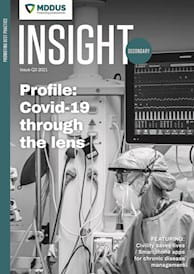![]()
BACKGROUND
A consultant psychiatrist – Dr M – contacts MDDUS in regard to a young patient, Mr B, who has been attending for regular consultations over the previous year. At their last session Mr B announced his intention to record all subsequent consultations on his smartphone.
Dr M is not comfortable with this and phones MDDUS for advice. He is worried that the recording may end up on social media and jeopardise doctor-patient trust.
ANALYSIS/OUTCOME
An MDDUS medico-legal adviser speaks with Dr M. She acknowledges that the request to record sessions can feel unsettling but advises that there is nothing to legally stop patients from doing so. Nor is there a requirement for a patient to seek consent. The information being recorded is regarded as personal data and confidential to the patient but not to the consulting clinician. Section 36 of the Data Protection Act provides an almost total exemption for individuals who are using personal data for their own domestic and recreational purposes. The Act views recording as simply the patient processing their own personal data.
A patient may wish to record a medical consultation for a number of reasons, such as to aid their memory if there is likely to be a complex discussion, or to allow a family member or carer to listen to the consultation to keep them informed of their care. They may also be dissatisfied with the advice given and therefore wish to seek a second opinion. It is also worth noting that recordings (covert or not) are admissible as evidence when judged as relevant to a legal case. An audio or video recording in such circumstances can be of benefit in that it may provide an accurate account of what took place in a consultation – proof that normal professional standards were maintained.
The adviser encourages Dr M to gently enquire into Mr B’s perceived need to record the consultation to help clarify matters. Demonstrating to Mr B that he is comfortable with him recording the consultation may encourage him to be more open and offer prior notice when he intends to record an encounter, rather than doing so covertly. The adviser refers Dr M to GMC guidance Decision making and consent, which highlights the importance of meaningful dialogue, personalised communication about potential benefits and harms, and how doctors can support patients to make decisions with them about treatment and care.
The emphasis is on patient choice and focusing discussions around treatment and procedures depending on patient circumstances. What’s important to one patient may not matter to another. Paragraph 17 of the guidance states:
"You should try to find out what matters to patients about their health – their wishes and fears, what activities are important to their quality of life, both personally and professionally – so you can support them to assess the likely impact of the potential outcomes for each option."
Being understanding of a patient’s wish to record their consultation may in fact enhance this process.
KEY POINTS
- Patients are allowed to record consultations without need for consent.
- Encourage patients to discuss why they want to record their consultation.
- Recordings may be admissible as evidence when judged relevant to a legal case.
This page was correct at the time of publication. Any guidance is intended as general guidance for members only. If you are a member and need specific advice relating to your own circumstances, please contact one of our advisers.
Read more from this issue of Insight Secondary

Save this article
Save this article to a list of favourite articles which members can access in their account.
Save to library